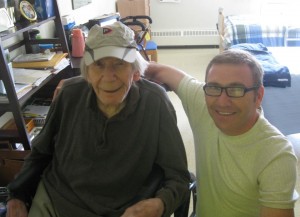“Did you earn it or inherit it?” This is the question that Socrates asks the shield-manufacturer Cephalus at the beginning of Plato’s Republic. Socrates asks this question about Cephalus’s wealth, noting that people who inherit wealth from another tend be less careful about its use than do people who have earned it themselves.
Already this is an important insight–it is when we have earned something for ourselves that we really appreciate its value, whereas when we receive something without effort we tend to be careless of it, taking it for granted and not respecting the effort and accomplishment (someone else’s) that it represents. There are other sides to the experience of inheriting, though, beyond this attitude of careless expenditure.
When something is explicitly bequeathed to us, we can receive this gift as an obligation to the donor: we can feel responsibility to “carry on” his or her intentions, even if that would not otherwise have been our desire. Perhaps, upon the handing down of my mother’s old camera, I decide to cultivate a practice of photography, or perhaps I tend carefully to what had been my father’s favourite roses. We can experience the gift, in other words, as the handing over of the need to care–quite the opposite of the frivolous expenditure we considered above.
 A third attitude is also possible. The death of our parents might leave us with various objects of sentimental value. Such objects we may hold onto reverentially, for the capacity they have to hold the dead in memory, to bear witness, in their absence, to their reality and their importance. A painting my father loved may become an object of intense attachment for me even though I never cared for its qualities as a painting: I hold it dear because it is a memory of him, the sign for me of his importance, which would otherwise go unrecognized in a world that has forgotten him.
A third attitude is also possible. The death of our parents might leave us with various objects of sentimental value. Such objects we may hold onto reverentially, for the capacity they have to hold the dead in memory, to bear witness, in their absence, to their reality and their importance. A painting my father loved may become an object of intense attachment for me even though I never cared for its qualities as a painting: I hold it dear because it is a memory of him, the sign for me of his importance, which would otherwise go unrecognized in a world that has forgotten him.
In The Muqaddimah, the great 14th Century Muslim philosopher and historian Ibn Khaldûn remarks that “Man is a child of the customs and the things he has become used to,” (Chapter 2, section 5), and our thoughts on inheritance can help us to reflect upon these “customs and things” that we live from. Like family goods, the accomplishments of culture are handed down to us. We ourselves do not “earn” the cultural goods we inherit; rather, we grow up taking for granted the terms, the structures, and the resources of a world made by others. The same three attitudes with which we might respond to a personal inheritance define our response to our cultural inheritance.
When we have not earned our wealth, we spend it easily: the lifestyle we thus develop relies upon the work of others–the work of those who created the wealth we inherit–but we need not be aware of that work and, hence, can be oblivious to the true character of our reliance. Taking our wealth–personal or cultural–for granted means that the true source–and “price”–of that wealth is unknown to us. Culturally, this means that we use, for example, roads, electricity, clean water, and accessible public space without learning the labour costs, the political practices, or the environmental resources that are required to make these goods available. It is this ignorance that allows us then to deal with matters of labour, politics and the environment in ways that undermine the very possibility of maintaining these goods. Since we did not participate in their making–since we did not “earn” them–we can fail to recognize what it takes to maintain them, and we can “spend” them foolishly.
The reverential attitude towards sentimental mementos leads us to value goods sentimentally at a level that exceeds their basic worth as functioning components of everyday life. This is not particularly a problem when I, privately, hold on to a dull pair of scissors that my mother used to use, but the cultural analog of this practice can be more troubling. We may reverentially insist upon maintaining certain practices–eating practices, dressing styles, or practices of marriage, sexuality, or parenting–because that is the way our culture’s founders are reputed to have acted, and at this point we risk crippling our cultural life with outmoded and unhealthy behaviours because our desire to recognize the importance of those cultural figures impedes our willingness to understand those practices for what they are.
 In contrast to both of these two attitudes, however, we can receive our cultural inheritance as a gift, and, in accepting the gift, accept the obligation to carry on on behalf of our ancestors, to do what they could not do in their lifetimes. In this attitude, we receive our inheritance like the torch that the relay-riders hand on to each other in the image with which Plato begins his Republic.
In contrast to both of these two attitudes, however, we can receive our cultural inheritance as a gift, and, in accepting the gift, accept the obligation to carry on on behalf of our ancestors, to do what they could not do in their lifetimes. In this attitude, we receive our inheritance like the torch that the relay-riders hand on to each other in the image with which Plato begins his Republic.
What it is like to thus receive an inheritance as an obligation? It is precisely to adopt the attitude that one must earn one’s inheritance for oneself. Our culture will always be something we receive–something granted–and we must always, thus, begin by taking it for granted: our culture, in short, will always be opaque to us, and we will always live on the basis of capacities and resources we did not earn for ourselves. Engaging with this responsibly, though, is precisely not to accept this condition as the last word, but to “own” one’s inheritance by learning the nature of one’s cultural institutions and practices, struggling to understand where they came from, and striving to take up responsibly the fundamental values that lie behind the accomplishing of that culture in the first place.
Such an earning of one’s tradition for oneself, however, will typically not be a static repetition of the form in which that tradition is already established, but will be a creative transformation of the received forms in a way that makes them responsive to the new and changed circumstances that characterize one’s own world, in contrast to the world of one’s predecessors. Fidelity to the past will come in the willingness to challenge the form in which it was handed down.


 Participants in these
seminars consistently have the experience of growth in their conversation and
conceptual abilities, and typically leave with a transformed sense of the nature
and possibilities of philosophy.
Participants in these
seminars consistently have the experience of growth in their conversation and
conceptual abilities, and typically leave with a transformed sense of the nature
and possibilities of philosophy.





3 Comments
“When something is explicitly bequeathed to us, we can receive this gift as an obligation to the donor.”
Islam, as I understand, has a particularly wonderful take on this. All wealth is regarded as the property of Allah and what one earns or inherits is custodianship, which comes with a responsibility to “carry on” the intentions of one’s benefactor, to manage that wealth to positive and charitable ends.
I mean this needn’t be specific to Islam. It can be true of however one conceives “Allah.” Whether one’s Allah is God, the Universe, Karma or merely the environmental mechanisms that enabled it’s acquisition.
Excellent points.